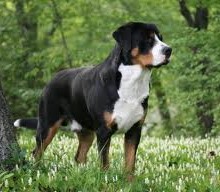Greater Swiss Mountain Dog
Lifestyle Needs

The Greater Swiss Mountain Dog or ‘Swissie’ is a large herding dog which needs plenty of space. He requires moderate activity and regular exercise and is most content when there is work to do. He is generally alert and vigilant and will bark at anything unusual. He has a well developed prey drive and should have a well fenced garden. The Swissie is not a dog for a first time owner and perhaps not the best choice for a family with young children. A dedicated owner is needed to give this magnificent dog the challenges and training he needs. He will need regular grooming to keep his coat in good condition. Temperament varies but there is breed tendency for dominant behaviours. Early socialisation with other dogs and people is essential.
Genetic Diversity
(Known as Coefficient of Inbreeding: 'COI'. It should be as low as possible.)
The UK Kennel Club breed average COI is 0.2% (based on UK pedigree records) - See 'A Beginners Guide to COI'
Gene Pool Size
(Known as Effective Population Size: 'EPS')
TBC
EPS is a measure of how many individuals are contributing genetically to a breed population. It is a measure of the size of the gene pool in a breed. Lower than 100 is considered critical by conservationists and below 50 brings a breed close to extinction. For more information see the Kennel Club article.
Health and Welfare Problems due to Conformation
(Body shape and physical characteristics)
- Gastric dilation volvulus (GDV) (Torsion/bloat) ‘bloat’ Common in deep chested breeds
- There are orthopedic concerns in large breed dogs. Great care must be taken to prevent injury to bones in growth stages.
BVA/KC Health Schemes: www.bva.co.uk/chs
- Hip dysplasia: breed 5 year mean score 9.3 (parents should be lower)
- Elbow dysplasia: scores should ideally be 0:0 (as low as possible)
- Eye disease: Progressive retinal atrophy (PRA) (annual testing); Hereditary cataract (HC) (annual testing)
Estimated Breeding Values (EBVs) : No EBVs are currently available for this breed
www.thekennelclub.org.uk/about-ebvs
DNA Tests Available
DogWellNet and IPFD Harmonisation of Genetic Testing for Dogs (HGTD)
www.dogwellnet.com/breeds
- Hyperuricosuria (HUU)
Availability of a DNA test does not mean that it is always necessary or even desirable for breeders to use this test.
Other Breed-Specific Health Screening Schemes
- Character test
- Heart test
- Eye disease litter test at 7 weeks
Ask the breeder to show you the certificates for the above tests/screening for both parents. If any of the above tests have not been considered necessary by the breeder (and there may be good reasons), ask her to explain why.
Other Diseases Reported
(For which there are currently no genetic or screening tests for sire or dam)
- Epilepsy
- Osteochondrosis – shoulder
- Cancer
- Entropion
- ‘Swissy Lick’
- Splenic torsion
Ask the breeder about the medical history of the parents, grandparents and great grandparents. Consider carefully whether to purchase a puppy if some of these or other diseases are in the family line.
Ask about the breeder’s policy in cases of serious genetic diseases occurring to your puppy in later life. Good breeders will request to be informed of such events in order to improve future breeding decisions.
You are strongly advised to buy from a breeder who uses (or is prepared to use) the AWF Puppy Contract and Puppy Information Pack (PIP): www.puppycontract.org.uk
The breeder should also be familiar with the CFSG/DBRG Code of Practice for Dog Breeding